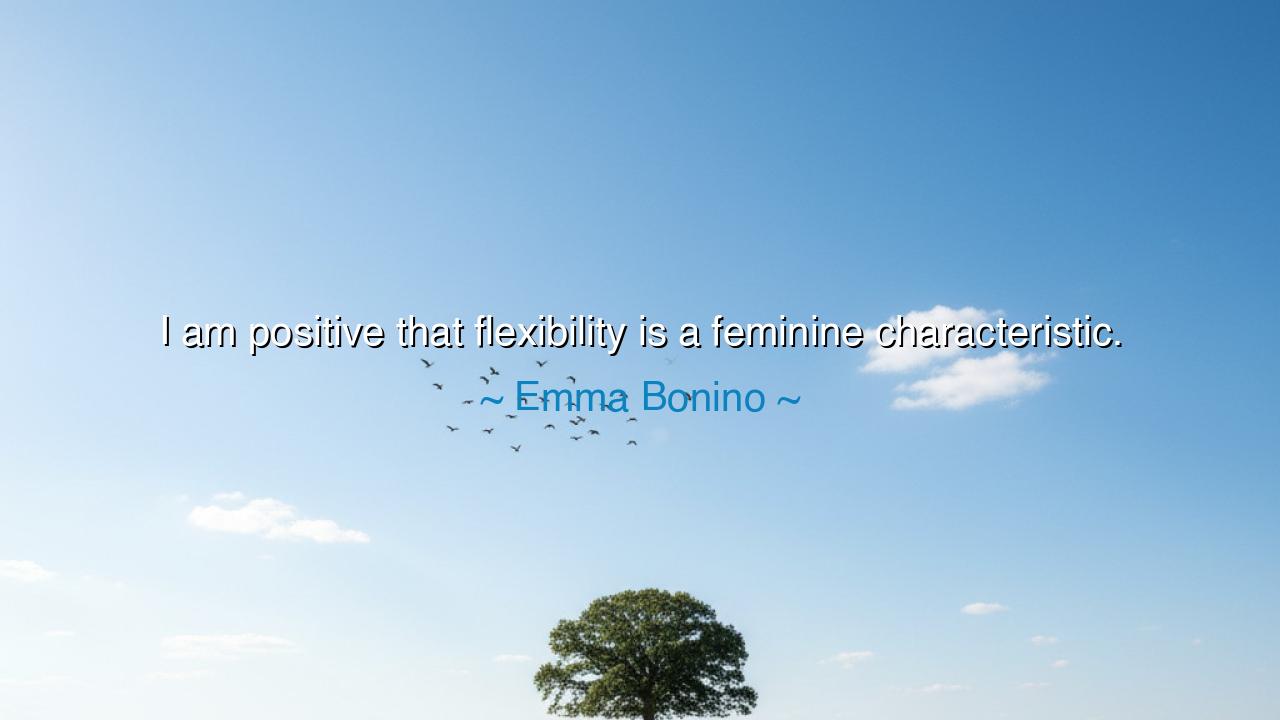
I am positive that flexibility is a feminine characteristic.






Hear the voice of Emma Bonino, a woman of courage and vision, who proclaimed with clarity: “I am positive that flexibility is a feminine characteristic.” These words, though simple, strike deep like the roots of an ancient tree. For they remind us that true strength is not always in rigidity, but in the power to bend without breaking, to adapt without surrender, to yield in form while holding firm in spirit. Bonino, a leader and reformer, spoke from the wisdom of observing both the trials of politics and the endurance of women throughout history.
The meaning of flexibility here is not weakness, but resilience. A rigid branch may snap in the storm, but the reed bends and rises again when the wind has passed. Likewise, women across generations have endured oppression, wars, hunger, and loss—not by meeting force with equal hardness, but by adapting, adjusting, and continuing onward. Bonino names this feminine characteristic not to confine it, but to honor it, to lift it up as an ancient truth: that the power of life itself flows through those who can change with the seasons yet remain unbroken.
History offers us vivid testimony of this. Recall the story of Eleanor Roosevelt, who began as a shy and overlooked woman, overshadowed by her husband’s greatness. Yet when history demanded it, she adapted with quiet strength. She stepped forward into public life, becoming a voice for the oppressed, the architect of the Universal Declaration of Human Rights, and the tireless champion of peace. Her greatness was born not of force, but of flexibility—the capacity to step into roles she had never imagined, to rise where circumstances demanded. Like water that fills the shape of its vessel, she proved that to be flexible is to be unstoppable.
Even in the myths of the ancients, the feminine is linked with the power of adaptation. Athena, goddess of wisdom, was not the strongest in battle, but she was the most cunning, devising strategies that overcame brute force. Demeter, goddess of the harvest, endured the loss of her daughter, yet shaped the rhythm of seasons from her grief. In both we see Bonino’s truth: flexibility as the essence of survival, wisdom, and creation.
Yet let us not mistake femininity for fragility. Bonino’s words remind us that to be flexible is the highest form of strength. It is easy to remain rigid, to stand immovable and claim it as power. But it is far harder to adjust one’s stance, to yield where yielding is wise, and to endure change without losing essence. True flexibility is the mark of those who cannot be destroyed, for they can transform as life demands.
From this teaching we may draw lessons for our own lives. First, when hardship comes, do not harden your heart in defiance, but learn to adapt. Change your path if needed, but never abandon your destination. Second, cultivate the wisdom of patience, for flexibility is not only action but the art of waiting, of knowing when to move and when to hold. Third, honor the feminine—within women, within men, within all humanity—that whispers endurance through transformation, not through force.
Practical actions flow from here. In conflict, seek dialogue, not only battle. In failure, seek a new way, not despair. In life’s storms, let your spirit be like the reed that bends but rises. And above all, honor those—often women—whose quiet flexibility has carried families, communities, and nations through the centuries. Their example is not weakness; it is the hidden root of survival itself.
Thus, Emma Bonino’s words shine as both truth and command: flexibility is the secret strength of the feminine, and it is a power the world must learn to honor. Let us carry this wisdom forward, not only to revere the women who embody it, but to cultivate it within ourselves, that we too may endure, adapt, and rise unbroken from every storm.






QMNgo Quang Minh
This statement also prompts reflection on leadership and adaptability. If flexibility is seen as a feminine trait, does that influence how women are perceived in workplaces, politics, or negotiations? Could framing flexibility this way be empowering by valuing traditionally feminine strengths, or limiting by reinforcing expectations about women’s behavior? Exploring these questions could provide insight into the subtle ways gendered perceptions shape opportunities and societal roles.
NAPhạm ngọc ánh
I find this quote thought-provoking but potentially controversial. How do we reconcile the idea of certain traits being gendered with modern understandings of equality and individual variation? Could emphasizing flexibility as feminine unintentionally minimize recognition of women in roles that require assertiveness or rigidity? Examining this tension may help explore the broader implications of gendered characterizations in both professional and personal spheres.
TDTran Thao Dan
Reading this makes me think about cultural interpretations of gender. In what ways does society reward flexibility in women and expect it from them? Does associating flexibility with femininity reflect observed patterns, or is it influenced by traditional norms that shape behavior over time? Considering this could lead to a discussion about how social conditioning versus biological tendencies contributes to the traits we associate with men and women.
JUJzjzjz UahNN
While the statement is intriguing, it raises questions about generalization. Are there men who exhibit high flexibility, and does attributing it predominantly to women risk oversimplifying human behavior? I’m curious about the contexts she has in mind—personal relationships, professional environments, or leadership? Exploring these contexts might clarify whether she sees flexibility as a strategic advantage, a social expectation, or a natural disposition associated with femininity.
LLDieu Linh Le
This quote sparks debate about gender and behavioral traits. Is Bonino suggesting that flexibility is innate to women, or that women develop it due to social roles and experiences? How might this idea intersect with discussions of equality and the danger of essentializing gender traits? Understanding her reasoning could help explore whether linking certain qualities to femininity empowers women, or whether it unintentionally reinforces limiting stereotypes.